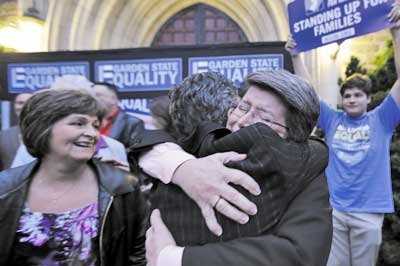New Jersey same-sex couples will be allowed to marry starting Oct. 21, pending an appeal from the state. In a landmark decision Sept. 27, Mercer County Superior Court Judge Mary Jacobson ruled that same-sex couples must have the right to marry to “obtain equal protection of the law under the New Jersey Constitution.” This is the first decision striking a state’s discriminatory marriage law that relies on the U.S. Supreme Court’s June ruling against the federal Defense of Marriage Act. Garden State Equality executive director Troy Stevenson said this case could be significant in leading how other states handle pending challenges to their marriage laws. “This will start to happen in jurisdiction after jurisdiction,” Stevenson told PGN. “The public is coming to acceptance of the LGBT population.” On Monday, however, New Jersey Attorney General John Hoffman appealed on behalf of the state. He also indicated he will seek a stay in the ruling until the appeal is settled, which, if granted, could push the start date back if the case is not settled by Oct. 21. Stevenson said the plaintiffs’ attorneys are already working on a response to the state appeal. “The state will be hard-pressed to prove irreparable harm and will be hard-pressed to get a stay in the jurisdiction,” he said. “Hundreds of loving couples will be getting married, so that is not viable.” Lambda Legal deputy legal director Hayley Gorenberg, who is handling the case, said she believes the plaintiffs have a good chance at victory. “I think our case is strong and has been throughout,” she said. “We will fight the appeal every step of the way and we have deep confidence in our position and in all the materials that back it up.” Hoffman filed the appeal in the state Supreme Court, bypassing the appellate court. The court could choose to hear the appeal or could send it first to the appellate court. At a news conference Monday, state Democratic leaders called on the state’s top court to fast-track the decision before the Oct. 21 date. State Senate president Steven Sweeney told PGN he expects the Supreme Court to hear the case quickly — and that it will be a success. “I would expect the court to rule in favor because of what happened with DOMA,” he said. The news of New Jersey’s tentative victory was a bittersweet moment for Equality Pennsylvania executive director Ted Martin, who noted Pennsylvania has yet to even adopt nondiscrimination protections for its LGBT citizens. “Once again, Pennsylvania finds itself more outlying and it is very frustrating. It outlines the amount of work that has to be done,” he said. “While marriage equality is important, we miss basic fundamental protections in Pennsylvania.” New Jersey’s fight for marriage equality started in 2006 with Lewis v. Harris, in which the state Supreme Court case ruled that same-sex couples are required to have the same protections as married heterosexual couples, prompting the legislature to adopt a civil-union law. In 2011, Lambda Legal challenged the civil-union law on behalf of Garden State Equality and a group of same-sex couples. The lawsuit was renewed July 3, when Lambda Legal asked Jacobson to avoid a trial and rule on the law in light of the U.S. Supreme Court finding that the federal ban on same-sex marriage was unconstitutional. Jacobson’s order noted that same-sex couples are harmed by their ineligibility for federal benefits. “This unequal treatment requires that New Jersey extend civil marriage to same-sex couples to satisfy the equal-protection guarantees of the New Jersey Constitution as interpreted by the New Jersey Supreme Court in Lewis,” Jacobson wrote. Stevenson said he was sitting at his computer when the news came through in an email. Although he and Garden State Equality took time that night to celebrate at an impromptu rally, the staff went right back to work on the next steps in the case. “It is not over until we can guarantee the freedom for couples to marry and right now we got it, but the court could change that,” he said. “We need to continue to push legislatively.” Sweeney said legislators are still working on overriding Gov. Chris Christie’s 2012 veto of marriage-equality legislation. Lawmakers have until Jan. 14 to do so. Sweeney said the pending bill’s religious exemption could be key in bringing on new Republican support. “We don’t think the court will give religious exemption and our legislation has religious exemption, so Republicans are more than likely to come on board so we can once and for all finish the job at hand,” he said. He added that supporters of marriage equality should continue to oppose Christie’s proposal to put the issue of same-sex marriage to a public vote. “It is a civil-rights issue, and you don’t put civil rights on the ballot.” Depending on the outcome of the appeal, if the ruling goes into effect Oct. 21, couples would be permitted to marry 72 hours after they receive their licenses. “If the administration doesn’t succeed in blocking the ruling, then people can get married on Oct. 24,” Gorenberg said. “But if they do succeed, we are going to fight for the ultimate win.”
Newsletter Sign-up
